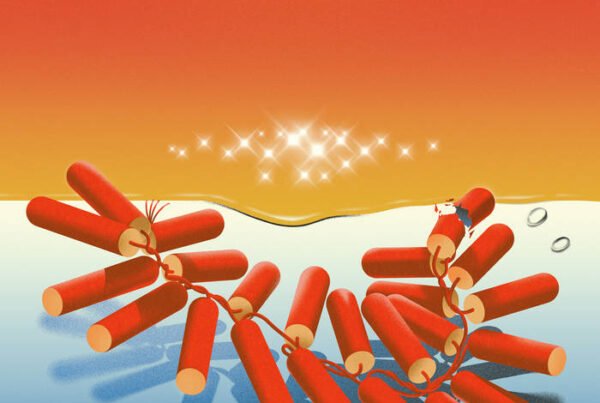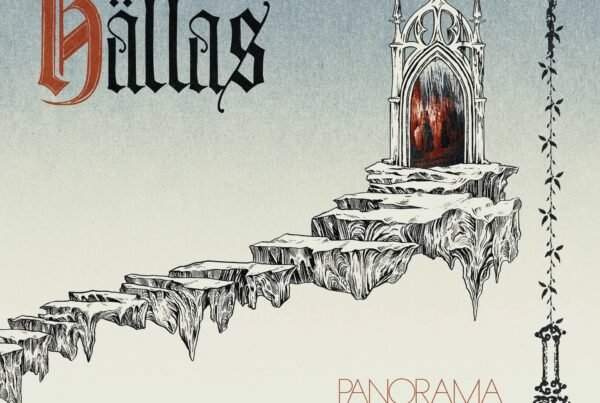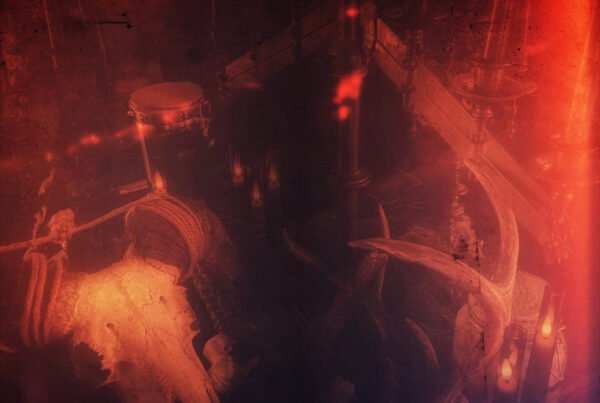Prepare to be bewildered by one of the finest experimental electronic artists out there.
Release date: March 15, 2022 | Blue Sub Records | Bandcamp | Facebook
Ever thought about shoving a few thousand different sounds in an aural blender and then serving said thing through a launch via a massive cannon straight into your brain and how would all of that feel? It really doesn’t matter though, because Ruby My Dear answers that question whether anyone asked it or not, in the form of a new album. Said new album, titled À Dada, will be the subject of my conversation with Eeli, which you can dive into below without any further ado.
Eeli: Hey Rob, what’s up?
Robert: Hey Eeli, I’m enjoying yet another casual day at work, which allows me yet again to engage in a conversational review. How about you?
E: You know, the regular chore’n’grind. Battling cold and co-workers, trying to find the time to be able to do something else not even remotely related to work.
R: I see, well, it’s all good, as we seem to manage somehow, right? Anyway, I was very surprised to see a Ruby My Dear album just materialized itself out of thin air without any kind of warning. I was even more surprised when I got to listen to it.
E: Cut the shit, ay? That’s alright.
Yeah, I was equally surprised to be honest. Didn’t see anything about such a thing anywhere prior to you asking about whether or not I’d be interested in reviewing it in tandem. Safe to say I was and still am, but it’s mind-boggling how this flied under the radar for me, considering I’ve been following his doings for a longer while already.
R: Same story here. I remember discovering Julien Chastagnol’s output about six years ago shortly after discovering Igorrr. Then I definitely grew fonder of his stuff, upon gorging on the contents of Brame, but À Dada just hits different.
I’m going to go ahead and say what everyone is thinking and few will admit (I think), À Dada is the Igorrr album we’ve been craving for almost five years. That’s not to dismiss in absolutely any measure the immense awesomeness of Spirituality and Distortion, as well as its contribution to the metal sphere, but À Dada really strikes me as a less bassy and less time-stretched-sample-abuse Igorrr record. It just checks all the major stylistic quirks.
E: I think I first heard about him around the release of that collaboration album with Igorrr, but guess the time wasn’t right as I passed on to other things for quite a while before discovering Brame. The aural connection to Igorrr is very present, and on À Dada I think it’s even more pervasive than before. That said, I wouldn’t compare the two too much, even though they share a similar gene pool.
Ruby My Dear relies definitely more heavily on the electronic component, and stands out because of that. About its quirks, there’s quite an abundance of those on À Dada.
R: I’d literally like to spend the entire conversation dissecting and debating how and why À Dada is more or less an Igorrr record, but also why not. I think that would be way too much of a sucker-punch by any standard to go down that route, so I’ll avoid it.
What I’d like to add though in that same breath and as a tangent to your last line, I also think that, indeed, the emphasis on the electronic element, more specifically that very recognizable blend of IDM and breakcore, is an absolute standout. I would also note that the biggest standout feature of the album is its almost cartoon like character at times. I think it would be more appropriately described as a highly ludic style of manifestation. There’s something innocent, joyous, and explosively energetic about it, just like the spontaneous childish wonder of playing around without any rhyme or reason.
E: I mean yeah, we could debate it for weeks on end, but I think saying it’s someone else’s album diminishes Julien’s artistic vision quite a bit, which I don’t think serves any purpose. If you listen to À Dada in the context of his entire career, it also avoids a lot of those direct connotations, I think.
I do wholeheartedly agree with your last point, I think first and foremost À Dada is a really fucking fun album. It’s lush and energetic while being all over the place, but still can pack an emotional punch whenever it needs to, and even get surprisingly dark at times. All in all it’s reminiscent of a ton of genres being ran through a blender, with the result being way more vibrant and oddly catchy than is the case with the more usual, avant-gardeistically inclined stuff out there.
R: Yeah, it definitely does the jack-of-all trades thing very well, while emerging at the other end as master of all instead of, of nothing. You have tracks like “NuNiNu” which beautifully showcase the aforementioned ludic trait, then heavy hitters like “Ma Matriochka” which feel like they’re plucked straight from a Rïcïnn record with their superb articulation and twisting emotive charge. But then there’s also absolute bangers like “Beacoup faire la cuisine” which not only aptly epitomize the essence of the record, but also slap like sonic booms.
It’s difficult to clearly describe the train of thought or narrative flow of a Ruby My Dear record, more specifically À Dada, but it’s definitely there, between the lines and the sheer madness. It transcends the apparent structural detail, emerging in front of the listener if the setting is right. There’s also a strong unifying feeling in spite of the wild disparities of the stylistic blend, which offers that nice organic vibe to it, contrasting nicely with the surface eclecticism. This also further shows that Chastagnol is amazingly thoughtful about his songwriting and compositional aptitudes, essentially saying (to me at least) that a modern composer doesn’t need an orchestra to say something properly.
E: Yeah, the ballpark he’s operating on is just immense. The whole album flows so very fluently together, though the more eloquent heavy-hitters do stand out from the rest easily. I think the likes of “Robinet”, “Touk Touk”, and “Ma Matriochka” are the most compelling tracks in that regard. The entity overall is maybe a tad rear-heavy too, as even though there’s plenty of hooks on every track, the biggest and most profound ones only hit later on. The sound design is absolutely stellar on the album, and at the end of the day, there’s very little – if anything – to complain about.
It also always amazes me how one mind is capable of producing this kind of racket, though at the same time, it’s blatantly obvious why something like this would be exceedingly difficult to pull off if it were for more than one person on the controls.
R: The sound design is flawless if you ask me. Even the most ardent nitpickers couldn’t realistically find a sliver of anything that can be seen as wrong. I won’t even elaborate on this, there’s nothing to really say besides that.
I also agree that the flow of it all is something of a curve ball. I think the same remark also stands when speaking of its impact. It took quite a few listens for its entire weight to really hit me for the first time and obviously a few more for it to really settle in.
Speaking of one mind, what’s more surprising to me than what you mention, is how a singular entity, namely Julien Chastagnol can craft such a complex, dynamic, and wild work without succumbing to the almost inevitable pitfalls of self-indulgence, which almost relentlessly plague solo artists or one person groups/bands. I think that when it’s all said and done, that’s the star of this show.
Very few artists manage to keep that kind of composure with themselves, so their creative poise just breaks under the pressure of the temptation of having the freedom to do literally anything. He also manages to not get caught on the other end where attempting to do everything at the same time yields a result that’s pure chaos — not in the good way. À Dada is basically a masterclass in this regard and is also a testament to creative focus.
E: I absolutely agree. It encapsulates the very essence of a solo artist, albeit that title is more often than not associated with other kinds of music. It’s exactly because of that, that things somehow stay coherent regardless of how eclectic, and full, the album is.
I do also agree that something like this requires attention and repeated listens in order for the listener to be able to truly enjoy it, since it treads right there on the verge of constant cacophony and artistic prowess.
While À Dada is definitely a showcase on Chastagnol’s musical identity, we shouldn’t forget the input of the multitude of guests found on the album. There are few spots in there that deserve a mention, like Laure Le Prunenec’s unexpected appearance and unmistakable delivery. I obviously had no idea she was going to appear on the record, but when she does, you immediately know who it is, and can’t be but in awe.
R: Yeah, Le Prunenec’s presence is instantly recognizable and impossible to glaze over and of course, always welcome. I was and still kind of am confused about all the guests on the record. There’s only a small liner note that offers thanks to several musicians on the album’s Bandcamp page, but really nothing else that’s a clear giveaway.
I also presumed for a while that since Le Prunenec is doing some vocals, that some of the screaming and growling is Serre’s but I just think it’s Chastagnol nodding in the general direction of Igorrr.
E: You know, I thought about the same thing, actually. But I think the certain kind of inconspicuousness with the guests in mind stems from the fact that there’s such a spectrum of instruments utilized here that you really can’t tell when someone additional pops up, unless you were extremely familiar with their respective styles.
R: Honestly, I think even the most avid listeners and hardcore fans would probably have trouble making that level of distinction, but yeah, I agree.
À Dada is definitely a handful, but a great one as well. It’s refreshing to see that experimental and avant leaning things are still flourishing in their own way and are brought more and more into the 21st century.
Ruby My Dear hits home on quite a few levels with me, and I’m sure that this record will quell the thirst of many others.






